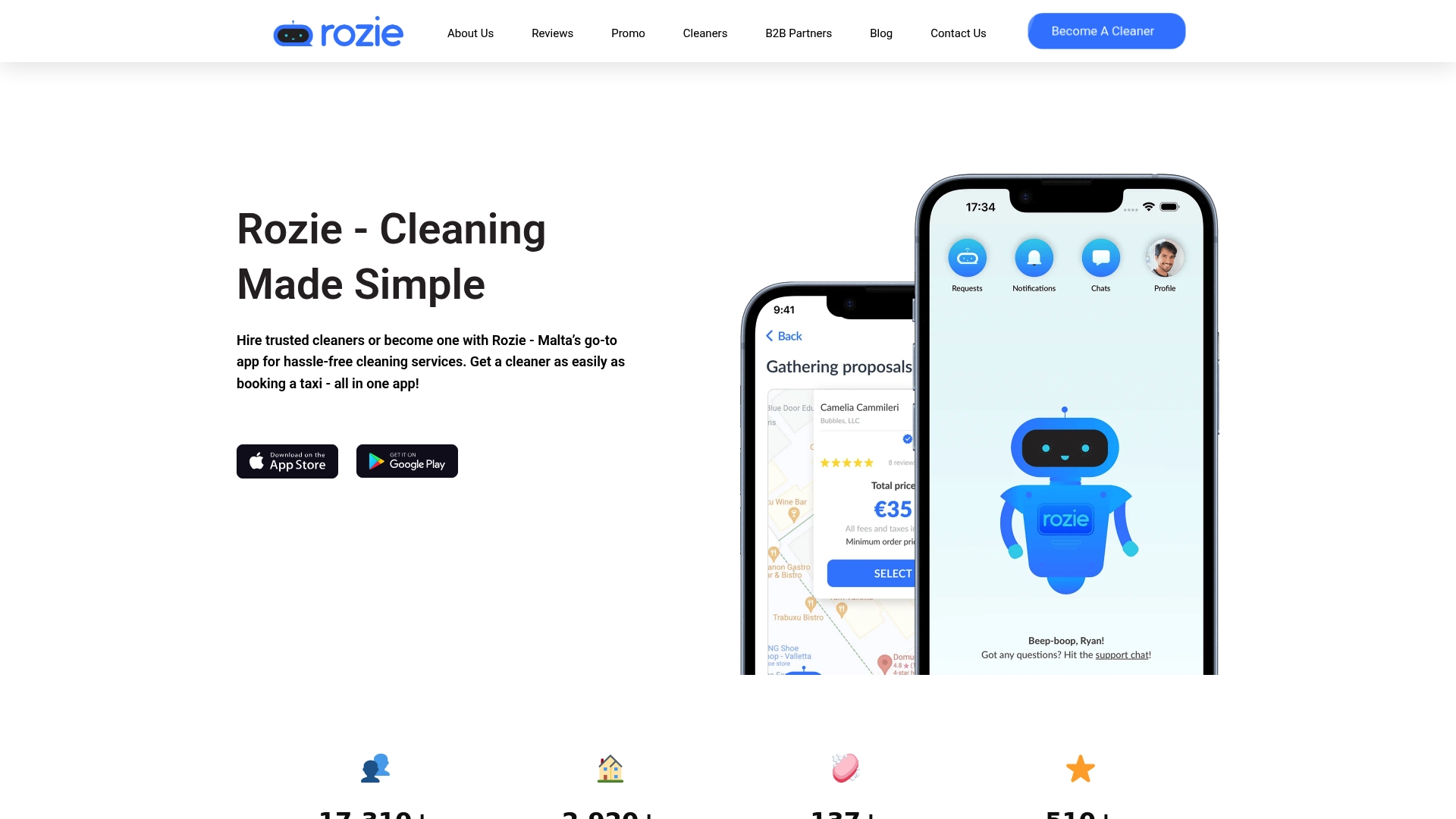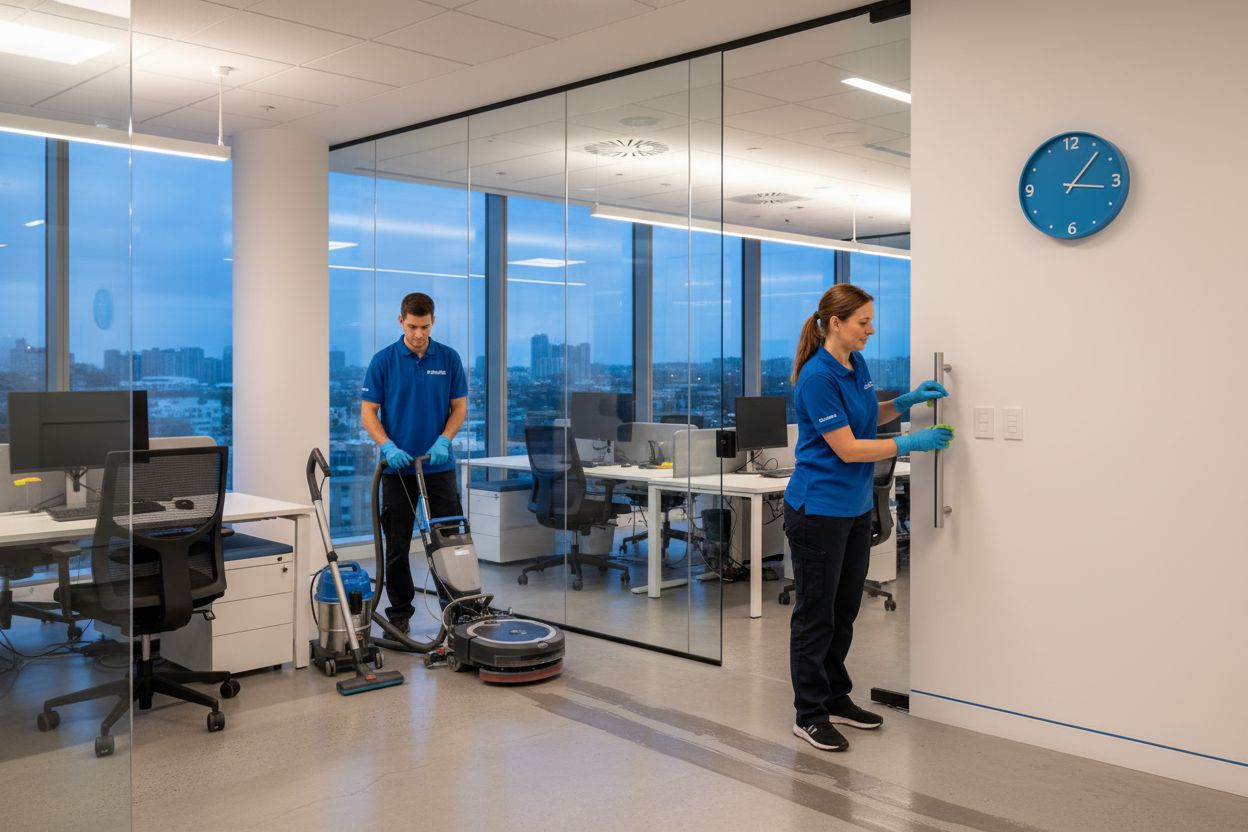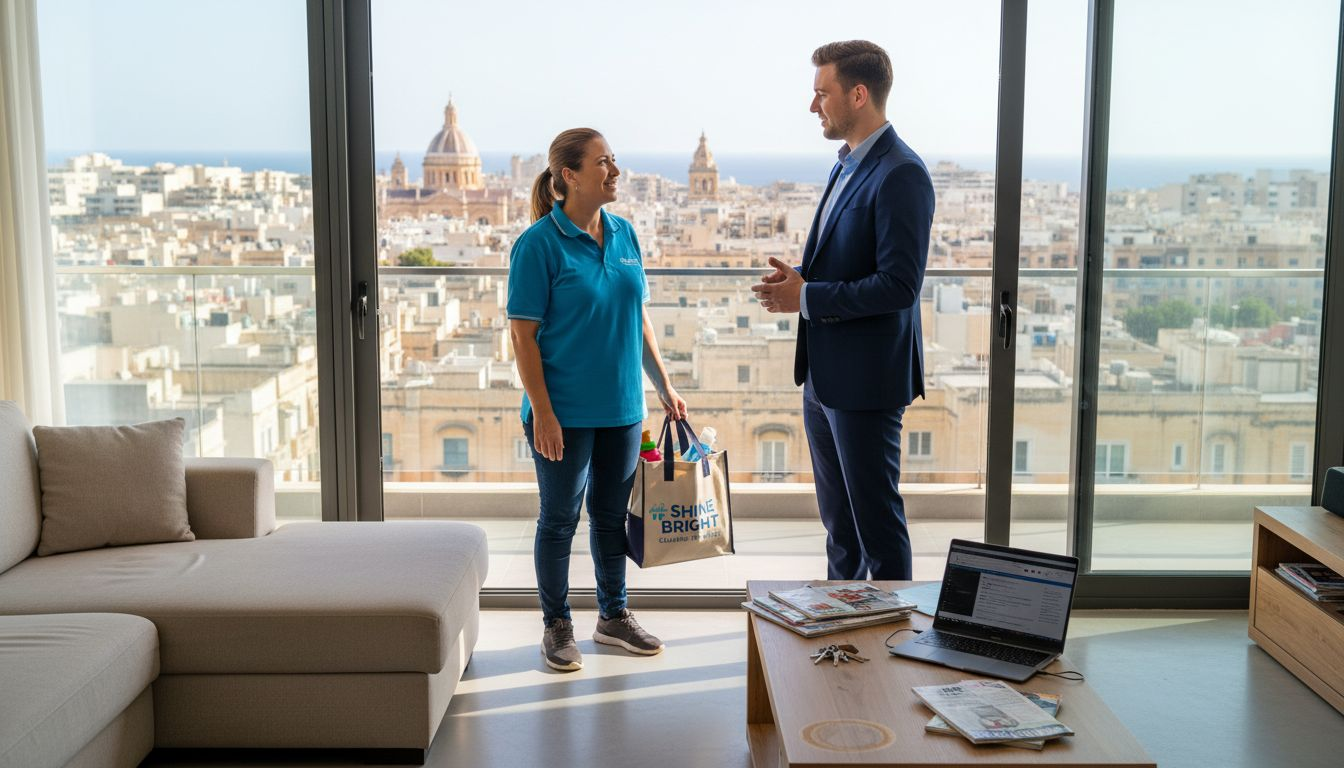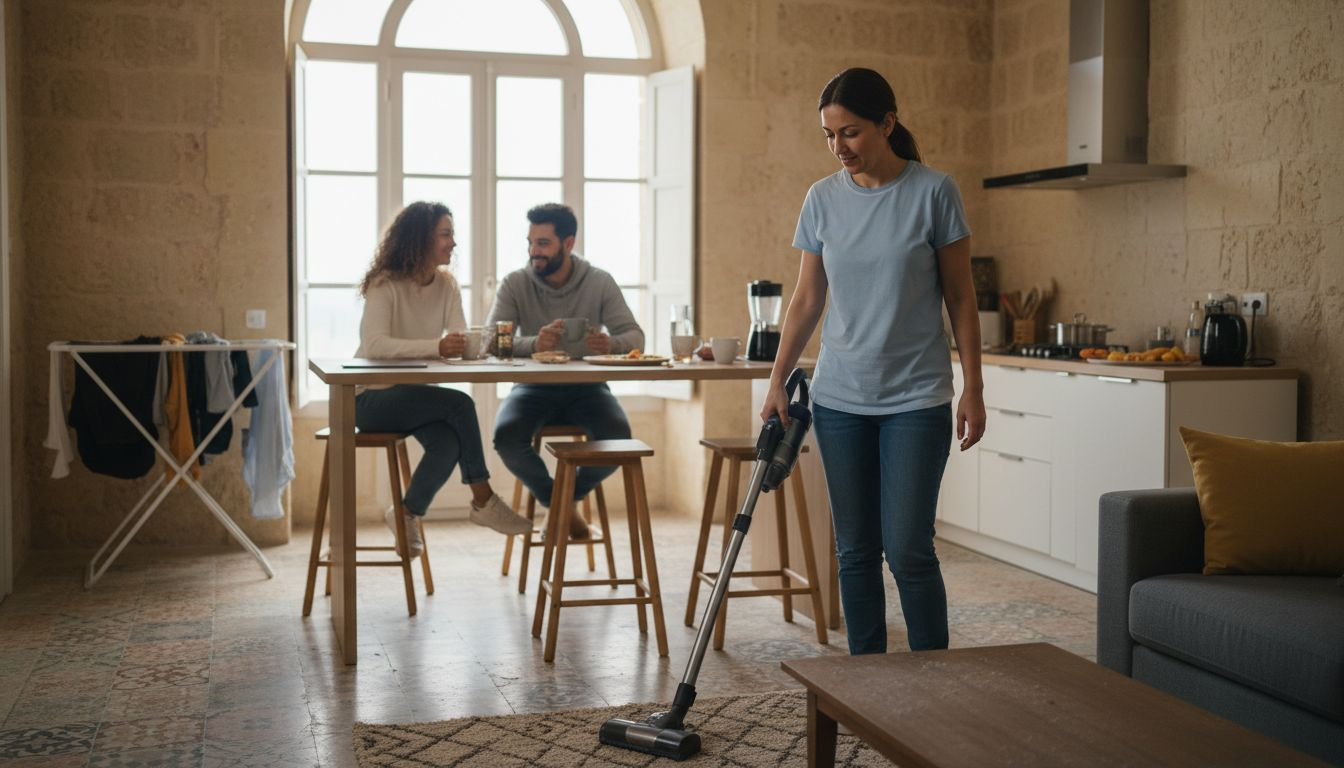Did you know that the home cleaning market in Germany alone is worth approximately €4.2 billion? The way people clean their homes differs greatly from how businesses maintain offices. While every space needs to be clean, the tools, schedules, and expectations for residential and commercial cleaning services are worlds apart. Understanding these differences can help you choose the best approach for a healthier environment and smarter spending.
Key Takeaways
| Point | Details |
|---|---|
| Scope of Cleaning | Home cleaning is focused on personal spaces while office cleaning deals with larger, complex environments. |
| Frequency and Regulation | Office cleaning usually requires daily or weekly services and must adhere to strict health and safety regulations, unlike more flexible home cleaning schedules. |
| Tools and Training | Office cleaning utilizes advanced tools and requires extensive professional training, contrasting with the basic methods and knowledge used in home cleaning. |
| Cost Structure | Home cleaning costs are variable and flexible, while office cleaning typically involves fixed contracts and standardized pricing models. |
Table of Contents
- Defining Home Vs Office Cleaning
- Comparing Cleaning Environments And Objectives
- Tools, Supplies And Training Differences
- Scheduling And Frequency Variations
- Safety, Hygiene And Regulatory Considerations
- Cost Implications And Value Comparison
Defining Home vs Office Cleaning
Cleaning isn’t a one-size-fits-all service – residential and commercial spaces have dramatically different requirements and approaches. Home cleaning and office cleaning might seem similar on the surface, but they differ in complexity, scope, and professional standards.
In residential settings, cleaning is typically more personal and focused on individual living spaces. According to research from market analysis reports, home cleaning services are heavily influenced by factors like urbanization and household income. For instance, in high-income urban areas like Germany, home cleaning services have become a substantial market segment worth approximately €4.2 billion.
Office cleaning, conversely, operates under much stricter parameters. Commercial cleaning research reveals that office cleaning isn’t just about aesthetics – it’s driven by regulatory requirements and workplace hygiene standards. Key differences include:
- Scope: Home cleaning focuses on personal spaces; office cleaning covers larger, more complex environments
- Frequency: Offices often require daily or weekly professional cleaning
- Equipment: Commercial spaces use industrial-grade cleaning tools and specialized techniques
- Compliance: Office cleaning must meet specific health and safety regulations
The professional approach to office cleaning in countries like Germany, the UK, and France demonstrates a systematic method that goes far beyond typical residential cleaning practices. These standards ensure workplaces maintain optimal cleanliness, contributing to employee health and productivity.
Comparing Cleaning Environments And Objectives
Cleaning environments are not created equal, with home and office spaces presenting unique challenges and objectives that demand distinct approaches. While both settings aim for cleanliness, their underlying goals and methodologies diverge significantly.
Research from Statista reveals that home cleaning in Central and Western Europe is increasingly driven by sustainability and multifunctionality. Homeowners prioritize environmental health and convenience, focusing on creating comfortable and eco-friendly living spaces. This contrasts sharply with office cleaning, which emphasizes standardized hygiene protocols and regulatory compliance.
Key differences in cleaning objectives include:
-
Home Cleaning Goals:
- Creating a comfortable personal environment
- Maintaining aesthetic appeal
- Reducing allergens and personal health risks
- Using eco-friendly and sustainable products
-
Office Cleaning Goals:
- Ensuring professional workspace standards
- Meeting health and safety regulations
- Minimizing disease transmission
- Presenting a professional corporate image
The psychological and functional requirements also differ dramatically. Home cleaning reflects personal preferences and comfort levels, while office cleaning must adhere to strict professional standards that protect collective health and maintain a productive work environment. This fundamental distinction drives the specialized techniques, equipment, and approach used in each setting.

Here’s a comparison of the key differences between home and office cleaning environments:
| Category | Home Cleaning | Office Cleaning |
|---|---|---|
| Scope | Personal spaces Smaller scale |
Larger, complex areas Multi-room |
| Frequency | Flexible Personal preference |
Daily or weekly Scheduled |
| Tools/Equipment | Standard household tools Low tech |
Industrial-grade tools Advanced tech |
| Training | Basic skills Informal knowledge |
Professional training Safety protocols |
| Regulations | Minimal Self-regulated |
Strict compliance Regulatory standards |
| Main Goals | Comfort Aesthetics Health |
Hygiene Safety Corporate image |
| Cost Structure | Variable Flexible packages |
Fixed contracts Predictable expenses |
Tools, Supplies And Training Differences
Professional cleaning environments require dramatically different tools, supplies, and training compared to residential cleaning, reflecting the complexity and scale of their respective tasks. The technological and skill gap between home and office cleaning has never been more pronounced.
Market research reveals that office cleaning has evolved into a sophisticated technological domain. Modern commercial cleaning now incorporates advanced equipment like:
- High-Tech Cleaning Tools:
- HEPA-filter vacuums for superior air quality
- Robotic scrubbers for large floor areas
- IoT-enabled supply dispensers
- AI-driven inventory management systems
Training requirements also differ significantly. Office cleaning professionals undergo extensive training that goes beyond basic cleaning techniques. They must understand:
- Complex safety protocols
- Chemical handling and environmental regulations
- Specialized equipment operation
- Infection control procedures
Home cleaning, by contrast, typically relies on more basic tools and personal knowledge. While residential cleaners use standard equipment like mops, vacuums, and household cleaning solutions, office cleaning demands a more systematic and scientifically informed approach. The investment in technology and training reflects the higher stakes of maintaining professional environments where health, productivity, and corporate image are interconnected.
Scheduling And Frequency Variations
Cleaning schedules represent one of the most significant differences between home and office environments, with timing and frequency driven by unique operational and personal needs. The strategic approach to cleaning varies dramatically across different settings and regions.
European Cleaning Journal research reveals fascinating insights into office cleaning scheduling. Approximately 70% of office cleaning occurs outside standard work hours—typically early mornings or evenings—to minimize disruption. Interestingly, Scandinavian countries like Sweden and Finland buck this trend, with up to 73-75% of cleaning performed during daytime hours.
Residential cleaning demonstrates a more flexible and personalized scheduling model. Market research highlights significant variations based on urbanization and income levels:
-
Office Cleaning Frequency:
- Typically daily or 3-5 times per week
- Scheduled around workplace operations
- Consistent and predictable timing
-
Home Cleaning Frequency:
- Varies widely by personal preference
- Higher-income regions prefer weekly/fortnightly subscriptions
- Lower-income areas use more ad-hoc cleaning approaches
These scheduling differences reflect the distinct purposes of each cleaning environment.
 Office cleaning maintains a professional, systematic approach prioritizing minimal workplace disruption, while home cleaning adapts to individual lifestyle rhythms and personal comfort standards.
Office cleaning maintains a professional, systematic approach prioritizing minimal workplace disruption, while home cleaning adapts to individual lifestyle rhythms and personal comfort standards.
Safety, Hygiene And Regulatory Considerations
Safety protocols and regulatory requirements create a stark contrast between home and office cleaning environments. While residential cleaning remains largely self-regulated, commercial cleaning operates under stringent guidelines that prioritize collective health and workplace standards.
Commercial cleaning research highlights how countries like Germany, UK, and France mandate specific hygiene and maintenance standards for office environments. These regulations go far beyond simple cleanliness, encompassing comprehensive health protection strategies that home cleaning rarely encounters.
Key regulatory differences include:
-
Office Cleaning Regulatory Requirements:
- Mandatory health and safety compliance
- Specific chemical handling protocols
- Regular professional hygiene assessments
- Documented cleaning and disinfection procedures
-
Home Cleaning Safety Considerations:
- Personal discretion in cleaning methods
- Limited formal safety requirements
- Informal approach to chemical management
- Individual risk assessment
The professional approach to office cleaning demands meticulous documentation, specialized training, and adherence to national workplace health standards. This systematic methodology ensures that shared work environments minimize health risks, protect employee well-being, and maintain a safe, productive workspace. Learn more about cleaning best practices to understand how these regulations translate into real-world cleaning strategies.
Cost Implications And Value Comparison
Cleaning costs represent a significant investment that varies dramatically between home and office environments, reflecting the complexity, scale, and specific requirements of each setting. Understanding these cost dynamics helps consumers and businesses make informed decisions about their cleaning strategies.
Home cleaning typically involves more flexible and personalized cost structures. Residential cleaning services range from one-time deep cleans to regular maintenance packages, with pricing influenced by factors like apartment size, frequency, and specific service requirements. Homeowners can often choose budget-friendly options or invest in more comprehensive cleaning solutions based on their financial constraints and personal preferences.
Office cleaning, by contrast, represents a more structured and predictable financial commitment:
-
Home Cleaning Cost Factors:
- Hourly or per-square-meter pricing
- Flexible service packages
- Variable frequency options
- Self-service or professional alternatives
-
Office Cleaning Cost Considerations:
- Contract-based pricing models
- Fixed monthly or quarterly expenses
- Standardized service level agreements
- Compliance and regulatory overhead
The value proposition differs significantly as well. Office cleaning isn’t just an expense but an investment in workplace productivity, employee health, and corporate image. Professional cleaning services ensure a sanitized, organized environment that directly impacts workforce efficiency and organizational reputation. Learn more about specialist cleaning approaches to understand the nuanced value beyond simple cost calculations.
Ready for Cleaning Without the Hassle? Discover Rozie.app
You have just learned about the major differences between home and office cleaning. Maybe you are feeling unsure about how to find a trusted and reliable cleaning solution that matches your exact needs. Whether you want a hygienic workplace that meets regulations or a comfortable home that feels inviting, the pain is real. Searching for truly verified cleaners in Malta is a challenge, and scheduling can take a lot of time and cause stress. Explore Cleaning in Malta to see how Rozie is already helping people solve these problems every day.

Stop letting uncertainty and wasted hours slow you down. Rozie.app gives you immediate access to background-checked home and office cleaners across Malta. The platform is easy to use, with flexible scheduling for any environment and payment protection you can trust. Visit Rozie.app to book a verified cleaner right now. If you want more business-focused cleaning insights, check out our Business Archives and News. Book with Rozie today and experience the next level of cleaning convenience.
Frequently Asked Questions
What are the main differences between home cleaning and office cleaning?
Home cleaning focuses on personal spaces and aims for comfort and aesthetics, while office cleaning targets larger, more complex environments with strict hygiene standards and compliance requirements.
How often should office cleaning be scheduled compared to home cleaning?
Office cleaning is typically scheduled daily or several times a week to maintain a professional environment, whereas home cleaning frequency varies based on personal preference, often ranging from weekly to ad-hoc services.
What tools and equipment are used in professional office cleaning compared to home cleaning?
Office cleaning utilizes industrial-grade tools such as HEPA-filter vacuums, robotic scrubbers, and IoT-enabled supply dispensers, while home cleaning generally employs standard household tools like mops and vacuums.
Are there specific safety regulations that apply to office cleaning that do not apply to home cleaning?
Yes, office cleaning must adhere to strict health and safety regulations, including compliance with chemical handling protocols and regular hygiene assessments, which are generally less formal for home cleaning.
Recommended
- Efficient Apartment Cleaning Checklist Guide for Busy Lives | Rozie – Malta’s Best Cleaning Services
- 8 Essential Maid Service Tips for Busy Lifestyles | Rozie – Malta’s Best Cleaning Services
- Who Needs House Cleaning? Understanding Its Importance | Rozie – Malta’s Best Cleaning Services
- 7 Essential Tips for Your Household Cleaning Planner | Rozie – Malta’s Best Cleaning Services



